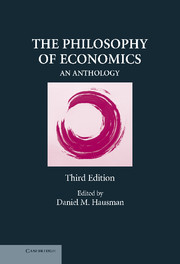Book contents
- Frontmatter
- Contents
- Introduction
- PART ONE CLASSIC DISCUSSIONS
- PART TWO POSITIVIST AND POPPERIAN VIEWS
- 7 The Methodology of Positive Economics
- 8 Testability and Approximation
- 9 Why Look Under the Hood?
- 10 Popper and Lakatos in Economic Methodology
- PART THREE IDEOLOGY AND NORMATIVE ECONOMICS
- PART FOUR BRANCHES AND SCHOOLS OF ECONOMICS AND THEIR METHODOLOGICAL PROBLEMS
- PART FIVE NEW DIRECTIONS IN ECONOMIC METHODOLOGY
- Selected Bibliography of Books on Economic Methodology
- Index
7 - The Methodology of Positive Economics
Published online by Cambridge University Press: 05 June 2012
- Frontmatter
- Contents
- Introduction
- PART ONE CLASSIC DISCUSSIONS
- PART TWO POSITIVIST AND POPPERIAN VIEWS
- 7 The Methodology of Positive Economics
- 8 Testability and Approximation
- 9 Why Look Under the Hood?
- 10 Popper and Lakatos in Economic Methodology
- PART THREE IDEOLOGY AND NORMATIVE ECONOMICS
- PART FOUR BRANCHES AND SCHOOLS OF ECONOMICS AND THEIR METHODOLOGICAL PROBLEMS
- PART FIVE NEW DIRECTIONS IN ECONOMIC METHODOLOGY
- Selected Bibliography of Books on Economic Methodology
- Index
Summary
Milton Friedman (1912–2006) was born in Brooklyn, New York, and received his Ph.D. in economics from Columbia University. He taught at the University of Minnesota, and then for many years at the University of Chicago. After 1977, he was a Senior Research Fellow at the Hoover Institution in Stanford, California. Friedman is best known for his work in monetary theory and for his concern for free enterprise and individual liberty. Milton Friedman was awarded the Nobel Prize in economics in 1976. The following essay, which is reprinted in its entirety, is the most influential work on economic methodology of this century.
In his admirable book on The Scope and Method of Political Economy John Neville Keynes distinguishes among “a positive science … [,] a body of systematized knowledge concerning what is; a normative or regulative science … [,] a body of systematized knowledge discussing criteria of what ought to be …; an art … [,] a system of rules for the attainment of a given end”; comments that “confusion between them is common and has been the source of many mischievous errors”; and urges the importance of “recognizing a distinct positive science of political economy.”
This [essay] is concerned primarily with certain methodological problems that arise in constructing the “distinct positive science” Keynes called for – in particular, the problem how to decide whether a suggested hypothesis or theory should be tentatively accepted as part of the “body of systematized knowledge concerning what is.”
- Type
- Chapter
- Information
- The Philosophy of EconomicsAn Anthology, pp. 145 - 178Publisher: Cambridge University PressPrint publication year: 2007
- 25
- Cited by

